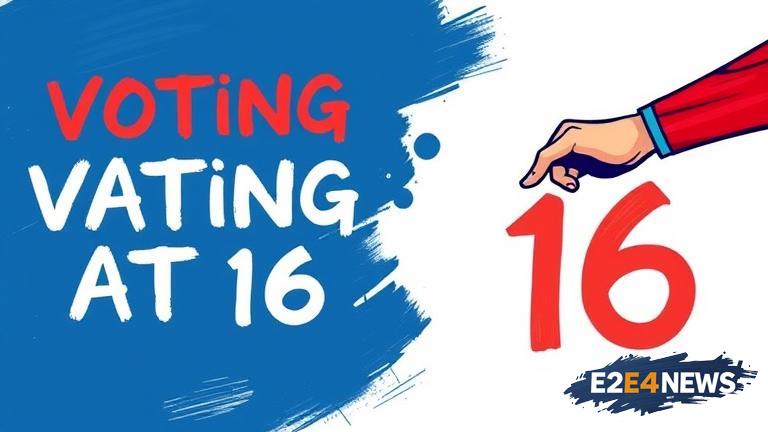The topic of voting at 16 has been a contentious issue in recent years, with many countries considering lowering the voting age to increase youth participation in the democratic process. Proponents of the move argue that 16-year-olds are mature enough to make informed decisions about their future and that it would lead to increased engagement and turnout among young people. They also point out that many 16-year-olds are already contributing to society through work, education, and volunteering, and therefore should have a say in the decisions that affect their lives. On the other hand, opponents claim that 16-year-olds lack the life experience and maturity to make informed decisions about complex political issues. They also argue that the brain is still developing at 16, and that young people may not have the cognitive ability to fully understand the implications of their votes. Furthermore, some argue that lowering the voting age would lead to a lack of consistency in the age of majority, which is currently set at 18 in many countries. Despite these concerns, several countries have already lowered their voting age to 16, including Scotland, Wales, and Austria. In these countries, the move has been seen as a way to increase youth engagement and participation in politics. However, the results have been mixed, with some studies showing an increase in turnout among young people, while others have found little impact. In the UK, the debate on voting at 16 has been particularly heated, with some arguing that it would lead to a more representative and inclusive democracy. Others have raised concerns about the potential impact on the electoral system and the ability of 16-year-olds to make informed decisions. The issue has also been linked to the broader debate about the age of majority and the rights and responsibilities of young people. Some have argued that if 16-year-olds are considered mature enough to vote, they should also be given other rights and responsibilities, such as the right to marry or join the military. Others have raised concerns about the potential consequences of lowering the voting age, including the potential for increased political polarization and the manipulation of young voters. In conclusion, the debate on voting at 16 is complex and multifaceted, with valid arguments on both sides. While some see it as a way to increase youth engagement and participation, others are concerned about the potential consequences and the ability of 16-year-olds to make informed decisions. Ultimately, the decision to lower the voting age should be based on careful consideration of the evidence and a thorough evaluation of the potential impacts. The issue is likely to continue to be debated in the coming years, with many countries considering the potential benefits and drawbacks of lowering the voting age. As the debate continues, it is essential to listen to the voices of young people and to consider their perspectives on the issue. By doing so, we can work towards creating a more inclusive and representative democracy that reflects the needs and concerns of all citizens. The topic of voting at 16 is also closely linked to the issue of civic education and the need to educate young people about politics and the democratic process. Many argue that civic education should be improved and expanded to ensure that all young people have the knowledge and skills they need to participate in the democratic process. This could include teaching critical thinking and media literacy skills, as well as providing opportunities for young people to engage in political debates and discussions. By improving civic education, we can help to ensure that all young people are equipped to make informed decisions about their future and to participate fully in the democratic process. The issue of voting at 16 is also closely tied to the broader debate about the role of young people in society and the need to create a more inclusive and representative democracy. Many argue that young people should be given a greater say in the decisions that affect their lives and that their voices should be heard in the democratic process. By listening to the perspectives of young people and considering their needs and concerns, we can work towards creating a more just and equitable society that reflects the needs and values of all citizens.
